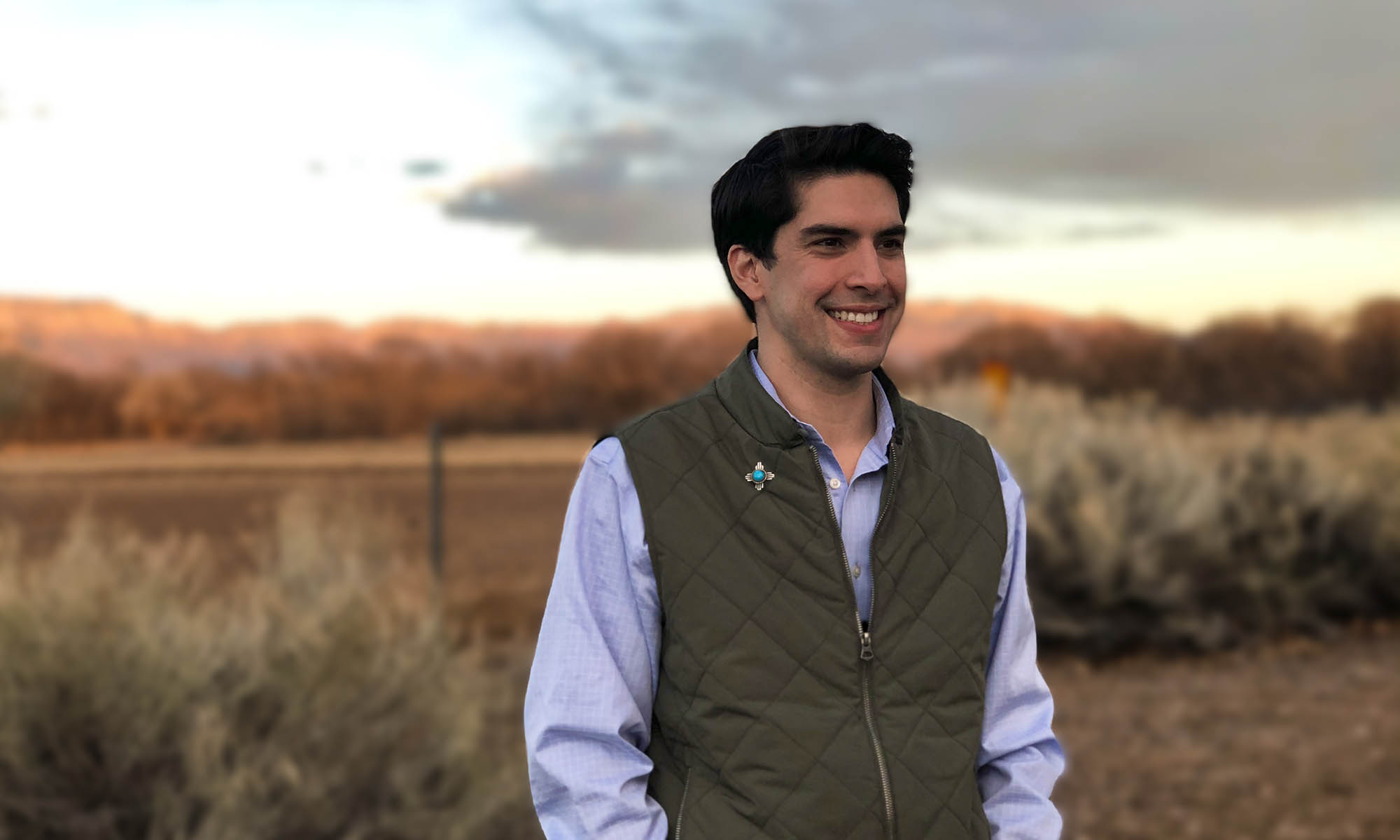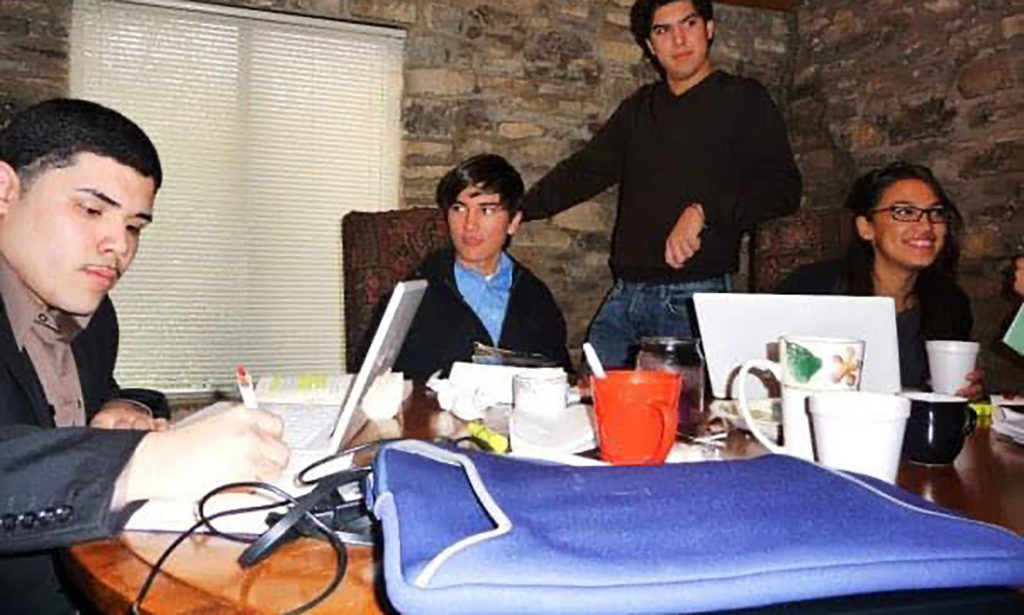Alumni, NHI News
From NHI to Congress: Victor Reyes aims to represent New Mexico

National Hispanic Institute alumnus Victor Reyes is continuing on a path that a select few NHIers have taken in recent years — running for Congress. He’s already had a leadership role behind the scenes in his adopted state of New Mexico, working as the legislative director for Governor Michelle Lujan Grisham. And he’s long had the inspiration to work to better the lives in his community: His mother, a longtime volunteer at public schools, taught him from an early age growing up on the border, “You’ve got to be a voice for people who feel they don’t have the words or the power themselves.”
He participated in the 2007 Texas Young Leaders Conference (now the Great Debate/GDx), the 2008 National Lorenzo de Zavala Youth Legislative Session, and the 2009 Texas CWS, and served in a variety of roles, including coaching and tournament directing, and was also an intern during college through NHI’s John F. Lopez Fellowship Program.
Now, he’s looking to represent New Mexico’s 1st District in a special election to replace newly-appointed Interior Secretary Deb Haaland and to become the second NHIer (after Xochitl Torres Small) to represent the Land of Enchantment in Congress. We spoke to Victor about why he’s running for Congress and how NHI influenced that.
How did you first learn about NHI, and what programs were part of your NHI journey?
I first learned about NHI at a presentation given at my high school about the Young Leaders Conference. It was big in the culture of our region and something that a lot of folks that I respected were a part of. And so I got involved and started going to NHI trainings every single weekend. I was in the extemporaneous speaking category of the YLC and I got to learn from some pretty incredible folks I still consider to be mentors today. I competed and placed in the tournament and then came back and became a trainer and a head coach. A big part of my life in high school was mentoring. I was a head coach by the time I was a sophomore in high school, and I was very proud to lead the team that ended up winning the Silver Cup [at the Texas YLC] … I continued to be involved in mentorship through the Institute, all the way through college.
I learned about the immense potential that our communities have to make change and to inspire change, working directly with so many talented, incredible community members who were young, who wanted to make a difference, who wanted to be involved in their community, who believed in the assets that they had at their disposal, who had been underestimated a lot of times in their lives, but were ready to prove to themselves and to others that they could be they could create lasting change. That was something that was extremely inspiring to me in my own life, something that I saw was inspiring to me as a participant, that I continue to realize throughout my development, that’s really stuck with me. To see so many young leaders find their own voices is something that I think we need to be doing more of in our community. We need to be inspired for more of that change, more of that development. That was a big factor for me.
What skills did you build during your time in NHI specifically?
I think for me, as someone who wanted to figure out how to be an effective messenger, talking about the issues facing the communities that I loved. The YLC really helped me develop my voice, and talk about how to talk about these issues and how to relay an effective message. The LDZ was an effective tool for me to figure out how I could use that voice in being strategic and implementing change. You know, I used the lessons that I learned in the LDZ and YLC throughout my entire career as a community advocate, as a public servant, when I was the legislative director to the Governor. Those were all important skill sets to me about how you operate within a system.
That’s often not one that was made to listen to the voices of young people, but you could be a force if you can navigate it. You can create lasting change within those systems and disrupt a system. The LDZ taught me that sometimes you need to disrupt a system, you need to figure out what the pressure points are, to create the change that you’re seeking to implement. You need to make sure that in order to bring that different perspective to the forefront, you need to know the process. And so that was a very helpful tool.
Honing in on the assets of a community, and not only looking at the deficit, and having that very clear, asset-minded mentality, I think it’s something that is really missing in conversations about leadership, and conversations about community and community building. And so that was important to me.
I think one of the things throughout all the programs that I learned was how important it was to build coalitions, and being with so many individuals that were all committed to their communities, all committed to giving back in their own ways, I think was something that inspired me to always be looking for those opportunities to build coalitions, to build community, to drive change.

How has the work you’ve done with Governor Lujan Grisham informed your leadership?
Governor Lujan Grisham is an incredible leader who is focused on delivering for New Mexicans. Whether it’s been throughout this pandemic, or whether it was in the first year of the administration, where we really sought to drive lasting change.
Oftentimes, we were faced with obstacles, we set ambitious goals that we knew would create lasting change for the state and for the people that we were serving. We met with a lot of resistance, often by the Legislature, by others who thought that things couldn’t be done, who thought that we were shooting too high. And it was I think it was in the last two years we’ve really proven that there should be no ceiling for the goals that you set.
Putting community first, and putting families first, is a trademark of this administration, making sure that those voices are always at the forefront of any decision. The last 11 months of the pandemic have been some of the most challenging times for the state, certainly for the nation, and having the opportunity to serve on the frontlines of the pandemic response was something that I think will always continue to have an impact on me. I truly had the opportunity to work with communities that are often left out of the conversation and often bore the weight of so many of the injustices that have been facing our state for generations, and those injustices were underlined by the pandemic in a very real way.
Whether it was working with sovereign nations or rural communities, to get them the resources and the help they needed, making sure that they had the food, the water, the means to communicate, test results … being able to make sure, to be very clear that these communities were a priority for us, was a very moving experience. Being decisive about the actions that you take in a pandemic is extremely important, and Governor Lujan Grisham built a team that helped create the decisive change help to make sure that we were implementing the policies that we needed to during a really difficult time in our state’s history. I think that’s really important.
One of the things that I took from NHI that we’ve sought to create is the idea that we can be aspirational, we can swing for the fences in creating change. We’ve passed some really landmark legislation, when it came to early childhood education and addressing climate change. I’m really grateful to have led the charge on some of those initiatives, and helping make sure that they made their way across the finish line.
So why are you running for Congress?
I’m running for Congress because I don’t think that we can wait for change any longer. You know, we get told by our leaders often that we need to wait, that the goals and the values that we believe in should take a backseat, or that we should be focused on really small incremental movement forward. And that’s not my brand of leadership. I think we’ve waited for too long.
I come from a family that’s not too different from so many of the families in this district. I’ve dealt with substance abuse disorder in my family, financial insecurity that came from those struggles, I know that the mental trauma that can come with that. I was the kid who would go to bed at night many times, worried about what the next day could bring.
There are so many challenges in this community. But I think that if we’re going to overcome those challenges, we need to be bold, and push for bold ideas and bold change. My record of delivering is something that I think is going to serve this community well in Congress, knowing that we can push for big changes, that we shouldn’t settle for just incremental movement forward. And so I know that I can be the most effective advocate for this district, because I’ve been delivering in real ways throughout my entire life on the very same issues that we’re talking about today.
I think that my record of delivering and getting issues across the finish line sets me apart from the other candidates in this race. I’ve worked in communities that don’t have access to water and wastewater, and I’ve helped bring federal resources into their communities. I was one of the statewide leaders of an environmental organization. I helped pass climate change legislation. When we talk about providing free college tuition, I helped lead that charge at the state level and when it came to providing free tuition for students going to two-year programs at public colleges and universities. I was the architect of a special session that provided more than $300 million of direct economic assistance during the pandemic, including $1200 supplemental payments before the holiday season, twice what Congress was able to deliver. So you know, I think my record, and my brand as a changemaker, sets me apart.
And finally, what should the Latino community be focused on, and how do you want to contribute to that?
I think the Latino community needs to be focusing needs to be a part of every single conversation. You know, we can’t say that we should be focused on one single issue, we should be focused on building stronger, more resilient communities. And making sure that we are leading the charge on those initiatives as part of the community.
I think we, as a community, are one of the greatest forces in this country, and should be at the forefront of every single conversation, whether we’re talking about making sure that we have environmental justice, addressing climate change, that we have a healthcare system that serves every single family, that we have the opportunity to create lasting economic resiliency, not just during this pandemic, but after this pandemic, making sure that we’re clear about the infrastructure investments that are truly going to serve our communities. I think that this community has to be actively engaged in every conversation, and refuse to be left out of any single dialogue.
To learn more about the Victor Reyes for Congress campaign, visit victorreyes.org.

Comments (0)